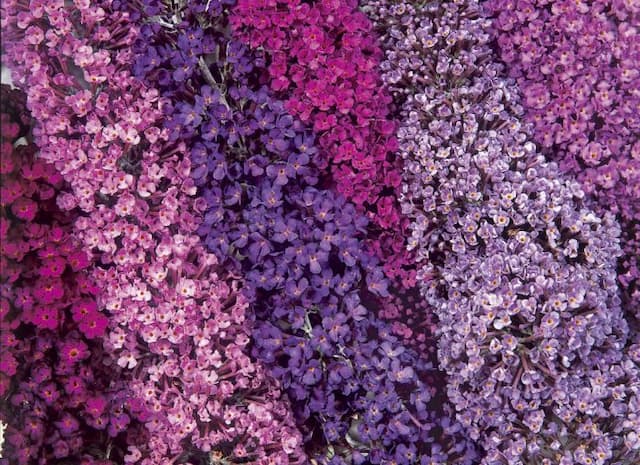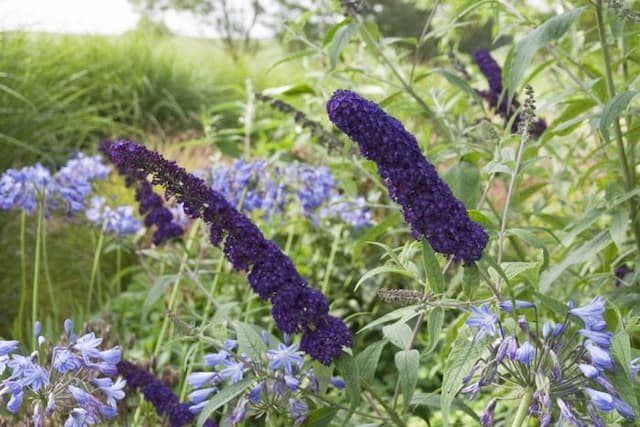Mullein Verbascum 'Summer Sorbet'

ABOUT
The Verbascum 'Summer Sorbet', commonly known as Mullein, presents a striking appearance with its dense foliage and showy flower spikes. The leaves are large, soft, and often have a fuzzy texture, which can range in color from a silvery green to a grayish hue. They form a basal rosette at the base of the plant from where they spread outwards. The plant's flowers are its most distinctive feature, typically arranged in a dense, elongated spike that towers above the foliage. These blossoms can vary in color, often displayed in a gradient of warm shades ranging from creamy yellow to apricot and soft pink. Each individual flower is relatively small and saucer-shaped, with a central staminal column that holds the stamens and pistils. When in bloom, the plant can become a focal point in a garden setting, drawing attention with its bold colors and tall, majestic flower spikes that sway gently in the breeze. The overall impression of the Verbascum 'Summer Sorbet' is that of a robust and rustic charm, with a touch of elegance provided by its colorful and plentiful blossoms.
About this plant
 Names
NamesSynonyms
Mullein, Velvet Plant.
Common names
Verbascum 'Summer Sorbet'.
 Toxicity
ToxicityTo humans
The common name of Verbascum 'Summer Sorbet' is mullein. Mullein is generally considered non-toxic to humans. However, it is important to note that while it is not inherently poisonous, consuming any plant material may potentially cause a reaction in certain individuals, especially if they have specific allergies or sensitivities. Ingestion is not common, and therefore poisoning is unlikely. If someone does ingest mullein and experiences adverse effects, symptoms might include gastrointestinal discomfort such as nausea, vomiting, or diarrhea. It is always best to consult a healthcare professional if any adverse effects are noted after ingesting any plant.
To pets
The common name of Verbascum 'Summer Sorbet' is mullein. Mullein is widely regarded as non-toxic to pets. Normally, pets do not show interest in consuming this plant, and it is not known to cause poisoning in pets. However, individual animals might have sensitivities or allergies that could lead to mild gastrointestinal upset if they ingest parts of the plant. If a pet consumes mullein and shows any signs of distress, including vomiting or diarrhea, it is advisable to consult a veterinarian. Generally, mullein does not pose a significant risk to pets.
 Characteristics
CharacteristicsLife cycle
Perennials
Foliage type
Semi-deciduous
Color of leaves
Green
Flower color
Yellow
Height
2 feet [60 cm]
Spread
1 foot [30 cm]
Plant type
Herb
Hardiness zones
5
Native area
Europe
Benefits
 General Benefits
General Benefits- Attracts Pollinators: Invites bees and butterflies, thus supporting biodiversity.
- Drought Tolerant: Once established, it requires minimal watering, making it suitable for xeriscaping.
- Low Maintenance: Easy to care for with no complex pruning or feeding requirements.
- Long Blooming: Offers a lengthy display of flowers throughout the summer months.
- Visual Interest: Adds aesthetic appeal to gardens with its tall spikes of colorful blooms.
- Cold Hardy: Can survive in cooler climates and return after winter dormancy.
- Deer Resistant: Less likely to be eaten by deer, protecting the garden's integrity.
- Easy to Propagate: Can be easily multiplied from seed or division, allowing gardeners to expand their collection.
- Versatile Planting: Suitable for mixed borders, cottage gardens, or as a standalone specimen.
- Soil Adaptability: Grows in a variety of soil types, although it prefers well-drained soil.
 Medical Properties
Medical PropertiesThis plant is not used for medical purposes.
 Air-purifying Qualities
Air-purifying QualitiesThis plant is not specifically known for air purifying qualities.
 Other Uses
Other Uses- Mullein 'Summer Sorbet' can be used as a natural dye for fabrics, providing a range of colors depending on the part of the plant used.
- The dried leaves of Mullein have been historically used as a wick material in lamps or candles due to their fibrous nature.
- This plant's tall, sturdy stalk can be used in creating natural garden stakes to support other plants.
- Mullein is sometimes used in floral arrangements, particularly the spikes of yellow flowers that add height and texture.
- The fuzzy leaves can be used as a natural insulating material in small-scale projects, such as lining birdhouses to keep them warm.
- Children can use Mullein's velvety leaves in nature crafts, such as creating woodland characters or "fuzzy" scenery.
- The seeds of Mullein can be used as a fish poison in survival situations, as they have been historically by indigenous peoples.
- Its leaves have also been used traditionally as shoe insulation to keep feet warm in cold weather.
- Mullein 'Summer Sorbet' can be used in permaculture designs as a pioneer plant to break up compacted soil before other plants are introduced.
- The visual texture and height of Mullein 'Summer Sorbet' make it suitable for use in theatrical stage designs or as part of movie set natural scenery.
Interesting Facts
 Feng Shui
Feng ShuiThe Mullein is not used in Feng Shui practice.
 Zodiac Sign Compitability
Zodiac Sign CompitabilityThe Mullein is not used in astrology practice.
 Plant Symbolism
Plant Symbolism- Healing: Verbascum, commonly known as Mullein, has a historical association with healing due to its medicinal properties, where it has been used to treat various ailments.
- Protection: The Mullein plant has been thought to ward off evil spirits and is traditionally used in protective charms.
- Love Divination: In some folklore, Mullein is used in rituals to divine the future of relationships, symbolizing the quest for clarity in love.
- Courage and Willpower: The plant's ability to thrive in tough conditions symbolizes courage and the will to persevere through challenges.
 Water
WaterFor the Verbascum 'Summer Sorbet', commonly known as Mullein, it's essential to establish a regular watering routine. Water young plants deeply to ensure a strong root system, providing about one gallon per week depending on weather conditions. Once established, Mullein is quite drought tolerant and requires less frequent watering—typically when the top inch of soil feels dry. During hot, dry periods, increase watering to prevent stress, but always allow for proper soil drainage to prevent root rot.
 Light
LightMulleins thrive in full sunlight, so it's best to position the Verbascum 'Summer Sorbet' in a spot where it can receive at least six hours of direct sunlight daily. They can handle some light afternoon shade in extremely hot climates, but too much shade will reduce flowering and potentially cause leggy growth.
 Temperature
TemperatureMulleins prefer temperate climates and the Verbascum 'Summer Sorbet' is no exception. It performs well in temperatures ranging from 40 to 85 degrees Fahrenheit. The plant can survive light frosts, but prolonged exposure to temperatures below 20 degrees Fahrenheit can be damaging. Ideally, maintain a growing environment within the plant's preferred temperature range for optimal growth and flowering.
 Pruning
PruningPrune the Verbascum 'Summer Sorbet' to remove spent flower spikes, which encourages the plant to produce new blooms and prevents self-seeding if undesired. Lightly prune back in late fall or early spring to maintain shape and remove any dead or damaged foliage. Pruning is typically needed on a seasonal basis or after a major bloom period, to keep the plant tidy.
 Cleaning
CleaningNot needed
 Soil
SoilMullein 'Summer Sorbet' thrives best in well-draining soil with a light mix of organic matter. A blend of garden soil, compost, and sand is ideal, ensuring good aeration and drainage. The preferred soil pH level for 'Summer Sorbet' is between 6.0 and 8.0.
 Repotting
RepottingMullein 'Summer Sorbet' does not need to be repotted often, as it typically has a biennial lifecycle. It can be repotted once it outgrows its current container or if the soil has degraded, generally every 2 to 3 years.
 Humidity & Misting
Humidity & MistingMullein 'Summer Sorbet' is tolerant of a wide range of humidity levels and does not require any specific humidity conditions. It is generally quite adaptable to the ambient humidity found in most outdoor garden environments.
 Suitable locations
Suitable locationsIndoor
Place in bright, indirect light and avoid overwatering.
Outdoor
Full sun, well-drained soil, water moderately.
Hardiness zone
5-9 USDA
 Life cycle
Life cycleThe Mullein 'Summer Sorbet', initially grows from seed, with germination typically occurring in spring when soil temperatures are warm enough to trigger sprout development. The seedlings emerge and develop into a rosette of basal leaves in their first year, which is a vegetative stage focused on growth and establishment. In its second year, the plant enters the reproductive phase, sending up a tall flowering stalk from the center of the leaf rosette, adorned with bright yellow flowers that attract pollinators. After pollination, the flowers produce capsules filled with seeds, ensuring the next generation of plants. Once the seeds are dispersed, usually by wind, the parent plant completes its life cycle and dies, being biennial in nature. The dispersed seeds remain dormant until conditions are right to start the cycle anew.
 Propogation
PropogationPropogation time
Spring-Early Summer
Propogation: Verbascum 'Summer Sorbet', also known as Mullein, is commonly propagated through the sowing of seeds. The optimal time for sowing these seeds is late winter to early spring, as they require a period of cold to break dormancy. To propagate Mullein by seed, one typically sows the seeds thinly onto the surface of a well-draining seed starting mix, as they need light to germinate. The seed tray should then be placed in a warm area, around 70 degrees Fahrenheit (21 degrees Celsius), and kept moist until germination occurs, which usually takes about 2 to 3 weeks. Once seedlings are large enough to handle, they can be transplanted into individual pots and later moved outdoors after the risk of frost has passed.


![Butterfly bush [Adonis Blue]](/_next/image?url=https%3A%2F%2Fplants-admin.emdemapps.com%2Fimages%2Fplants%2F%2Fimages%2F604b56e58f983.png&w=640&q=75)


![Butterfly bush [Buzz Ivory]](/_next/image?url=https%3A%2F%2Fplants-admin.emdemapps.com%2Fimages%2Fplants%2F%2Fimages%2F604b57987dfa8.png&w=640&q=75)
![Butterfly bush [Camberwell Beauty]](/_next/image?url=https%3A%2F%2Fplants-admin.emdemapps.com%2Fimages%2Fplants%2F%2Fimages%2F604b5ead04c12.png&w=640&q=75)


